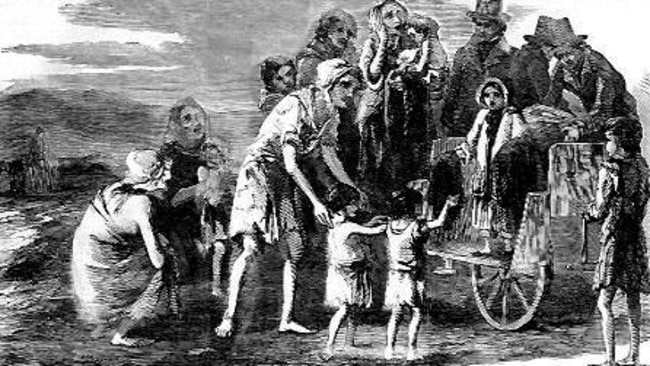Hunger Movements in Early Victorian Literature: Want, Riots, Migration
Europe of the late 18th and early 19th centuries was ablaze with war and revolution.

Europe of the late 18th and early 19th centuries was ablaze with war and revolution. Successive waves of refuge-seeking ‘‘foreigners’’ fleeing the troubles of the continent, washed up on Britain’s shores. Closer to home, in the English countryside, the Scottish Highlands and, most devastatingly, Ireland, hundreds of thousands of starving poor were on the move, migrating to find food and work and demanding a say in their future.
Lesa Scholl’s Hunger Movements tells the story of these bleak times through the lens of early Victorian writers and the pre-eminent political, social and economic thinkers of the age. Our modern world of excess seems far removed from the starvation caused by the potato blight and the catastrophic disruptions of the Industrial Revolution, but many of the human responses and emotions still resonate.
The key authors examined — Charles Dickens, Elizabeth Gaskell, George Eliot, Charlotte Bronte, Harriet Martineau and Henry Mayhew — canvas a wide spectrum of hungers and tastes, both physical and social, and their impact on individuals and communities.
Scholl says the writers were “each concerned with economic narratives and social justice, and each, most importantly, sought to give voice to characters in fiction who, in ‘real’ life, would not have that level of political space.” She adds that “cries for social reform emerged from the desperate hunger of those dismissed by economic statistics”. Those who see history and literature operating in the parallel universes of fact and fiction may be surprised by the historical insights of these Victorian novels. Some, including Dickens’s A Tale of Two Cities and David Copperfield, Eliot’s The Mill on the Floss and Bronte’s Jane Eyre are generally known to modern readers of Victorian literature, though others, such as Dickens’s Barnaby Rudge, are less widely read today.
In their pages the daily struggles of fictional lives nestle uncomfortably within the historical, economic and social revolutions of the time. Scholl, a Brisbane-based academic, tills a fertile field and identifies a range of social, human and political responses to hunger and want. The book is “loosely positioned between the 1832 and 1867 Reform Acts in order to emphasise the central thesis that the need to have a political voice and a sense of belonging is intrinsically connected to seasons of food scarcity, and individual and communal hunger”.
Now, as then, economies grow and wither, politics ebb and flow and new technologies replace old. Surely modern, post-industrial democracies such as Britain and Australia have learned to adjust to rapid shifts and changes in ways earlier societies could not? Or have we?
Take the concept of ‘‘those dismissed by economic statistics’’. It has a familiar tone. Similar words have been used recently to describe the political appeal of Donald Trump, the Brexit vote, or even the ‘‘pox on both your houses’’ protest vote in the recent Australian elections.
Of course one mustn’t stretch such comparisons too far. The three contemporary political circumstances mentioned are exercises in representative democracy — people having their say — whereas the working class Chartists marching, protesting, and rioting in the 19th century were campaigning for basic political rights. Nor does the widespread starvation in Britain and Ireland in the 19th century have a genuine parallel in contemporary Britain, though tragic circumstances elsewhere continue to have an impact on British life.
The early-19th-century waves of European and Irish refugees have been replaced by waves of refugees fleeing troubles in North Africa and the Middle East or workers seeking reprieve from Europe’s economic failings. The response of Victorian England to ‘‘foreigners’’ is chillingly familiar, with ‘‘concerns of being overwhelmed by impoverished foreigners straining the already beleaguered labour market’’.
While Hunger Movements is set and embedded in the Victorian era, the author does make occasional forays into the present to show how “disaffection among the disenfranchised poor persists as a social narrative into the 21st century”. She compares the seemingly random violence of perhaps 15,000 troublemakers in the 2011 BlackBerry riots in London with some of the great civic uprisings of earlier times: the 40,000-60,000 strong mob at the Gordon riots of 1780 and the estimated 120,000 who marched and later rioted in protest against the House of Lords’ rejection of the Reform Bill in 1831. There is something hauntingly prescient in her assertion: “Like hunger that remains unchecked, the unchecked hungry crowd is uncontrollable.”
Hunger Movements is an academic text grounded in scholarship, extensively footnoted, supported by a 13-page bibliography and targeted at a specialist audience. However, its narrative, if not its price tag, is accessible to a more general reader, particularly ones with some knowledge of the history and literature of the era. A passing knowledge of political and economic thoughts of the time, including seminal works by authors such as Thomas Carlyle and John Stuart Mills, is also helpful.
Books referenced are placed in context with other texts quoted and the author’s overarching arguments. Not surprisingly, as a general rather than a specialist reader, I gained most from the novels and authors I knew best and conversely struggled most with those I knew least. Reading Hunger Movements had one unexpected offshoot. Its revelations on want, riots and migration gave interesting new perspectives that triggered fresh exploration of some near-forgotten Victorian classics.
John Algate is a Brisbane writer and journalist
Hunger Movements in Early Victorian Literature: Want, Riots, Migration
By Lesa Scholl
Routledge, 210pp, $160 (HB)



To join the conversation, please log in. Don't have an account? Register
Join the conversation, you are commenting as Logout